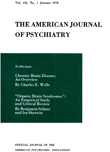A GRAPHIC COMPARISON OF FIVE PHENOTHIAZINES
Abstract
Five phenothiazine derivatives have been studied using similar groups of patients and similar methods of evaluating and recording behavioral change. All of the patients included in these reports had been hospitalized longer than one year and had been refractory to previous treatment efforts.
The results indicate that this group of chronic patients, all but 3 of whom were schizophrenic, were no more responsive to these compounds than to treatment procedures earlier tried. The graphing of the data simplifies the comparison of compounds evaluated under similar conditions.
Improvement occurred so infrequently in these screening procedures that a controlled or "double-blind" study did not appear necessary.
Access content
To read the fulltext, please use one of the options below to sign in or purchase access.- Personal login
- Institutional Login
- Sign in via OpenAthens
- Register for access
-
Please login/register if you wish to pair your device and check access availability.
Not a subscriber?
PsychiatryOnline subscription options offer access to the DSM-5 library, books, journals, CME, and patient resources. This all-in-one virtual library provides psychiatrists and mental health professionals with key resources for diagnosis, treatment, research, and professional development.
Need more help? PsychiatryOnline Customer Service may be reached by emailing [email protected] or by calling 800-368-5777 (in the U.S.) or 703-907-7322 (outside the U.S.).



